BUSI 1323 Leadership in Organisations
VerifiedAdded on 2021/08/20
|14
|4341
|38
AI Summary
Contribute Materials
Your contribution can guide someone’s learning journey. Share your
documents today.
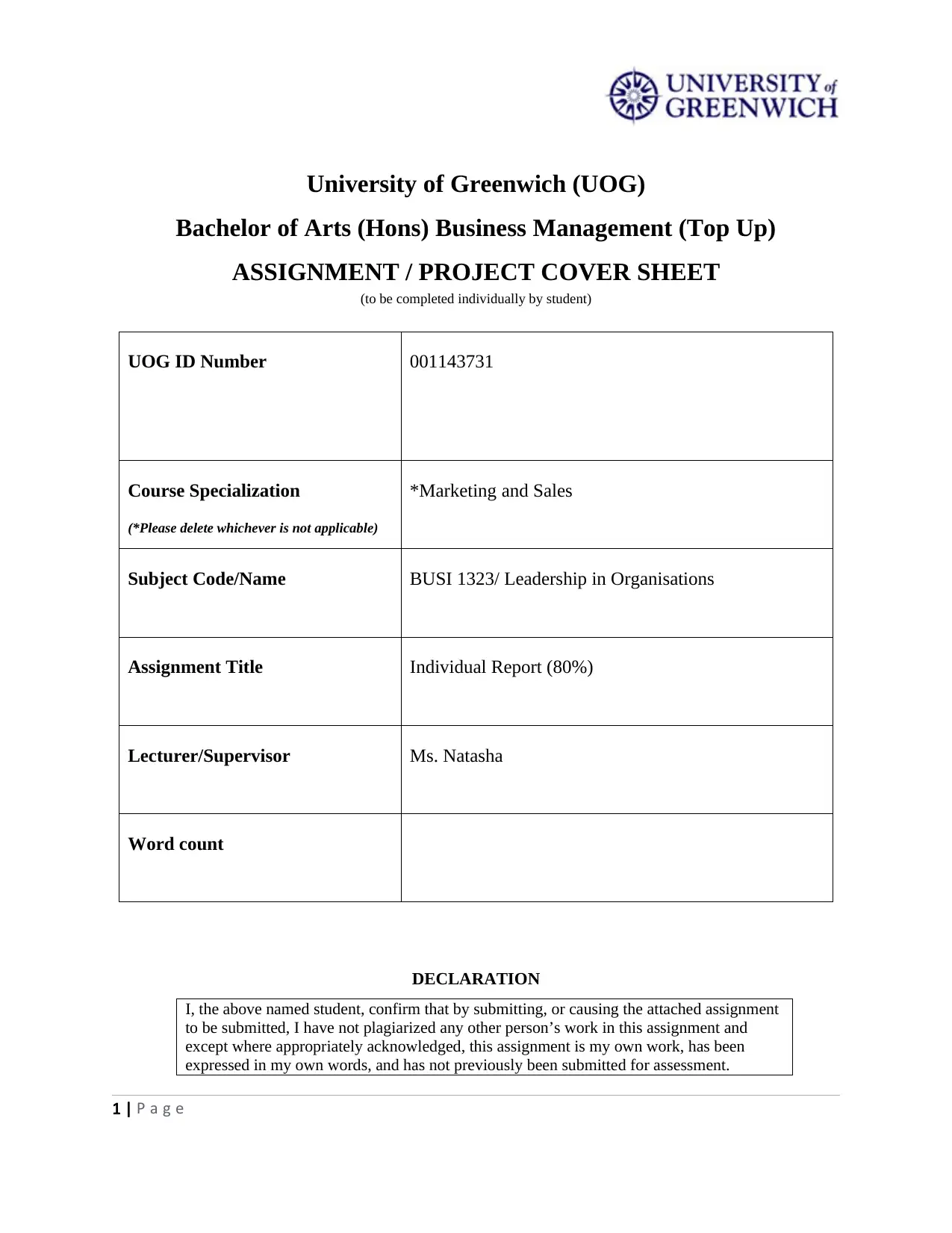
University of Greenwich (UOG)
Bachelor of Arts (Hons) Business Management (Top Up)
ASSIGNMENT / PROJECT COVER SHEET
(to be completed individually by student)
UOG ID Number 001143731
Course Specialization
(*Please delete whichever is not applicable)
*Marketing and Sales
Subject Code/Name BUSI 1323/ Leadership in Organisations
Assignment Title Individual Report (80%)
Lecturer/Supervisor Ms. Natasha
Word count
DECLARATION
I, the above named student, confirm that by submitting, or causing the attached assignment
to be submitted, I have not plagiarized any other person’s work in this assignment and
except where appropriately acknowledged, this assignment is my own work, has been
expressed in my own words, and has not previously been submitted for assessment.
1 | P a g e
Bachelor of Arts (Hons) Business Management (Top Up)
ASSIGNMENT / PROJECT COVER SHEET
(to be completed individually by student)
UOG ID Number 001143731
Course Specialization
(*Please delete whichever is not applicable)
*Marketing and Sales
Subject Code/Name BUSI 1323/ Leadership in Organisations
Assignment Title Individual Report (80%)
Lecturer/Supervisor Ms. Natasha
Word count
DECLARATION
I, the above named student, confirm that by submitting, or causing the attached assignment
to be submitted, I have not plagiarized any other person’s work in this assignment and
except where appropriately acknowledged, this assignment is my own work, has been
expressed in my own words, and has not previously been submitted for assessment.
1 | P a g e
Secure Best Marks with AI Grader
Need help grading? Try our AI Grader for instant feedback on your assignments.
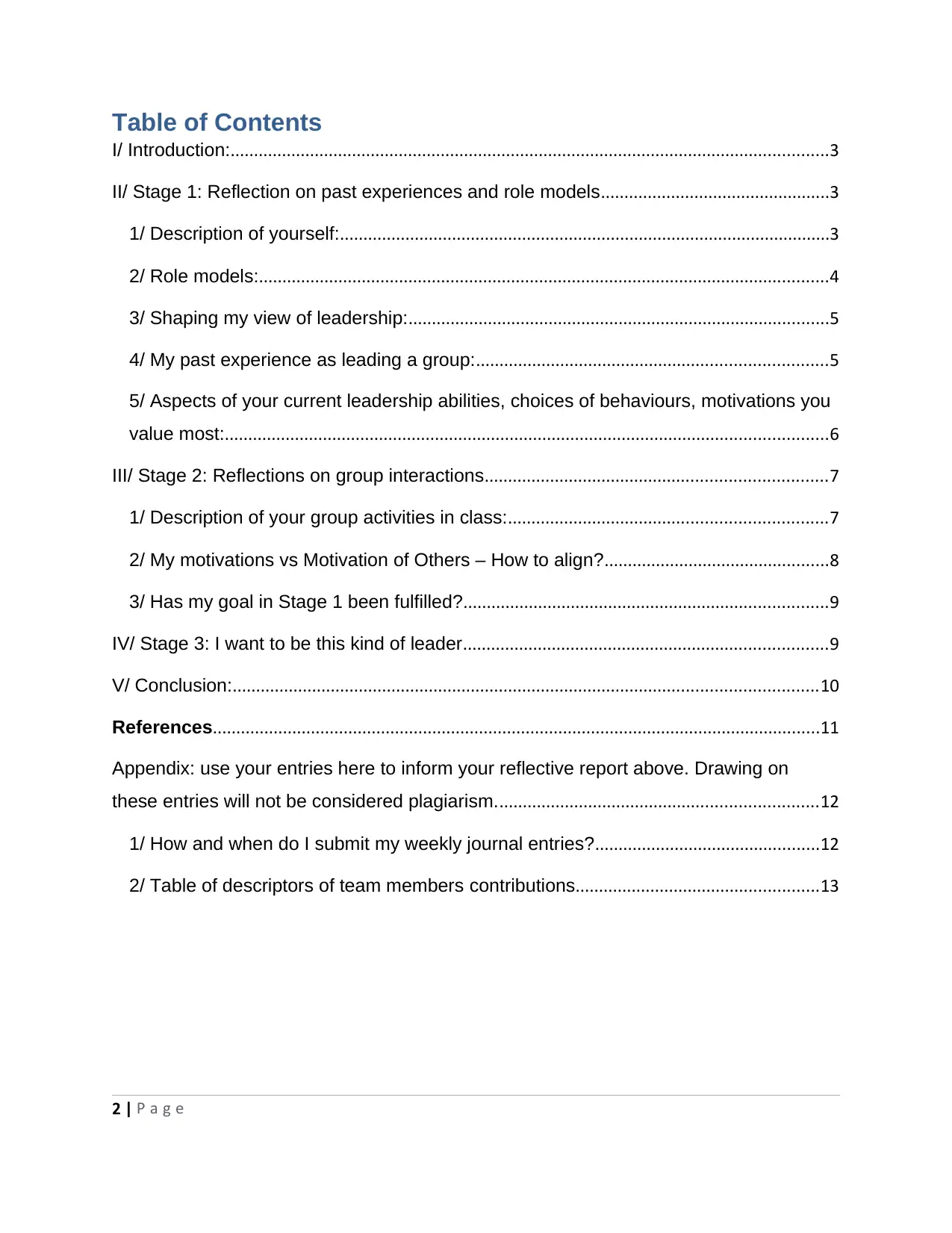
Table of Contents
I/ Introduction:................................................................................................................................3
II/ Stage 1: Reflection on past experiences and role models.................................................3
1/ Description of yourself:.........................................................................................................3
2/ Role models:..........................................................................................................................4
3/ Shaping my view of leadership:..........................................................................................5
4/ My past experience as leading a group:...........................................................................5
5/ Aspects of your current leadership abilities, choices of behaviours, motivations you
value most:.................................................................................................................................6
III/ Stage 2: Reflections on group interactions.........................................................................7
1/ Description of your group activities in class:....................................................................7
2/ My motivations vs Motivation of Others – How to align?................................................8
3/ Has my goal in Stage 1 been fulfilled?..............................................................................9
IV/ Stage 3: I want to be this kind of leader..............................................................................9
V/ Conclusion:.............................................................................................................................10
References..................................................................................................................................11
Appendix: use your entries here to inform your reflective report above. Drawing on
these entries will not be considered plagiarism.....................................................................12
1/ How and when do I submit my weekly journal entries?................................................12
2/ Table of descriptors of team members contributions....................................................13
2 | P a g e
I/ Introduction:................................................................................................................................3
II/ Stage 1: Reflection on past experiences and role models.................................................3
1/ Description of yourself:.........................................................................................................3
2/ Role models:..........................................................................................................................4
3/ Shaping my view of leadership:..........................................................................................5
4/ My past experience as leading a group:...........................................................................5
5/ Aspects of your current leadership abilities, choices of behaviours, motivations you
value most:.................................................................................................................................6
III/ Stage 2: Reflections on group interactions.........................................................................7
1/ Description of your group activities in class:....................................................................7
2/ My motivations vs Motivation of Others – How to align?................................................8
3/ Has my goal in Stage 1 been fulfilled?..............................................................................9
IV/ Stage 3: I want to be this kind of leader..............................................................................9
V/ Conclusion:.............................................................................................................................10
References..................................................................................................................................11
Appendix: use your entries here to inform your reflective report above. Drawing on
these entries will not be considered plagiarism.....................................................................12
1/ How and when do I submit my weekly journal entries?................................................12
2/ Table of descriptors of team members contributions....................................................13
2 | P a g e
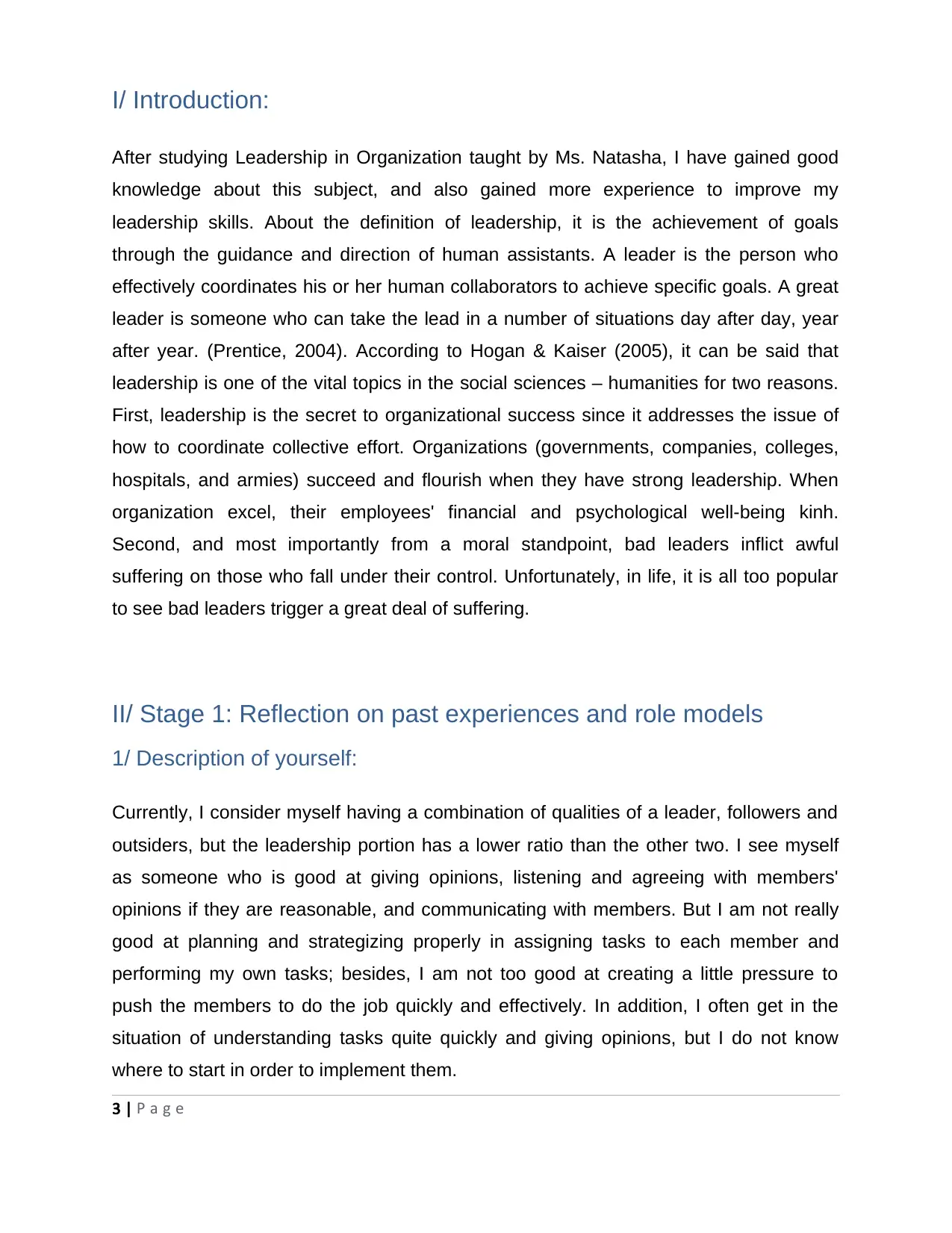
I/ Introduction:
After studying Leadership in Organization taught by Ms. Natasha, I have gained good
knowledge about this subject, and also gained more experience to improve my
leadership skills. About the definition of leadership, it is the achievement of goals
through the guidance and direction of human assistants. A leader is the person who
effectively coordinates his or her human collaborators to achieve specific goals. A great
leader is someone who can take the lead in a number of situations day after day, year
after year. (Prentice, 2004). According to Hogan & Kaiser (2005), it can be said that
leadership is one of the vital topics in the social sciences – humanities for two reasons.
First, leadership is the secret to organizational success since it addresses the issue of
how to coordinate collective effort. Organizations (governments, companies, colleges,
hospitals, and armies) succeed and flourish when they have strong leadership. When
organization excel, their employees' financial and psychological well-being kinh.
Second, and most importantly from a moral standpoint, bad leaders inflict awful
suffering on those who fall under their control. Unfortunately, in life, it is all too popular
to see bad leaders trigger a great deal of suffering.
II/ Stage 1: Reflection on past experiences and role models
1/ Description of yourself:
Currently, I consider myself having a combination of qualities of a leader, followers and
outsiders, but the leadership portion has a lower ratio than the other two. I see myself
as someone who is good at giving opinions, listening and agreeing with members'
opinions if they are reasonable, and communicating with members. But I am not really
good at planning and strategizing properly in assigning tasks to each member and
performing my own tasks; besides, I am not too good at creating a little pressure to
push the members to do the job quickly and effectively. In addition, I often get in the
situation of understanding tasks quite quickly and giving opinions, but I do not know
where to start in order to implement them.
3 | P a g e
After studying Leadership in Organization taught by Ms. Natasha, I have gained good
knowledge about this subject, and also gained more experience to improve my
leadership skills. About the definition of leadership, it is the achievement of goals
through the guidance and direction of human assistants. A leader is the person who
effectively coordinates his or her human collaborators to achieve specific goals. A great
leader is someone who can take the lead in a number of situations day after day, year
after year. (Prentice, 2004). According to Hogan & Kaiser (2005), it can be said that
leadership is one of the vital topics in the social sciences – humanities for two reasons.
First, leadership is the secret to organizational success since it addresses the issue of
how to coordinate collective effort. Organizations (governments, companies, colleges,
hospitals, and armies) succeed and flourish when they have strong leadership. When
organization excel, their employees' financial and psychological well-being kinh.
Second, and most importantly from a moral standpoint, bad leaders inflict awful
suffering on those who fall under their control. Unfortunately, in life, it is all too popular
to see bad leaders trigger a great deal of suffering.
II/ Stage 1: Reflection on past experiences and role models
1/ Description of yourself:
Currently, I consider myself having a combination of qualities of a leader, followers and
outsiders, but the leadership portion has a lower ratio than the other two. I see myself
as someone who is good at giving opinions, listening and agreeing with members'
opinions if they are reasonable, and communicating with members. But I am not really
good at planning and strategizing properly in assigning tasks to each member and
performing my own tasks; besides, I am not too good at creating a little pressure to
push the members to do the job quickly and effectively. In addition, I often get in the
situation of understanding tasks quite quickly and giving opinions, but I do not know
where to start in order to implement them.
3 | P a g e
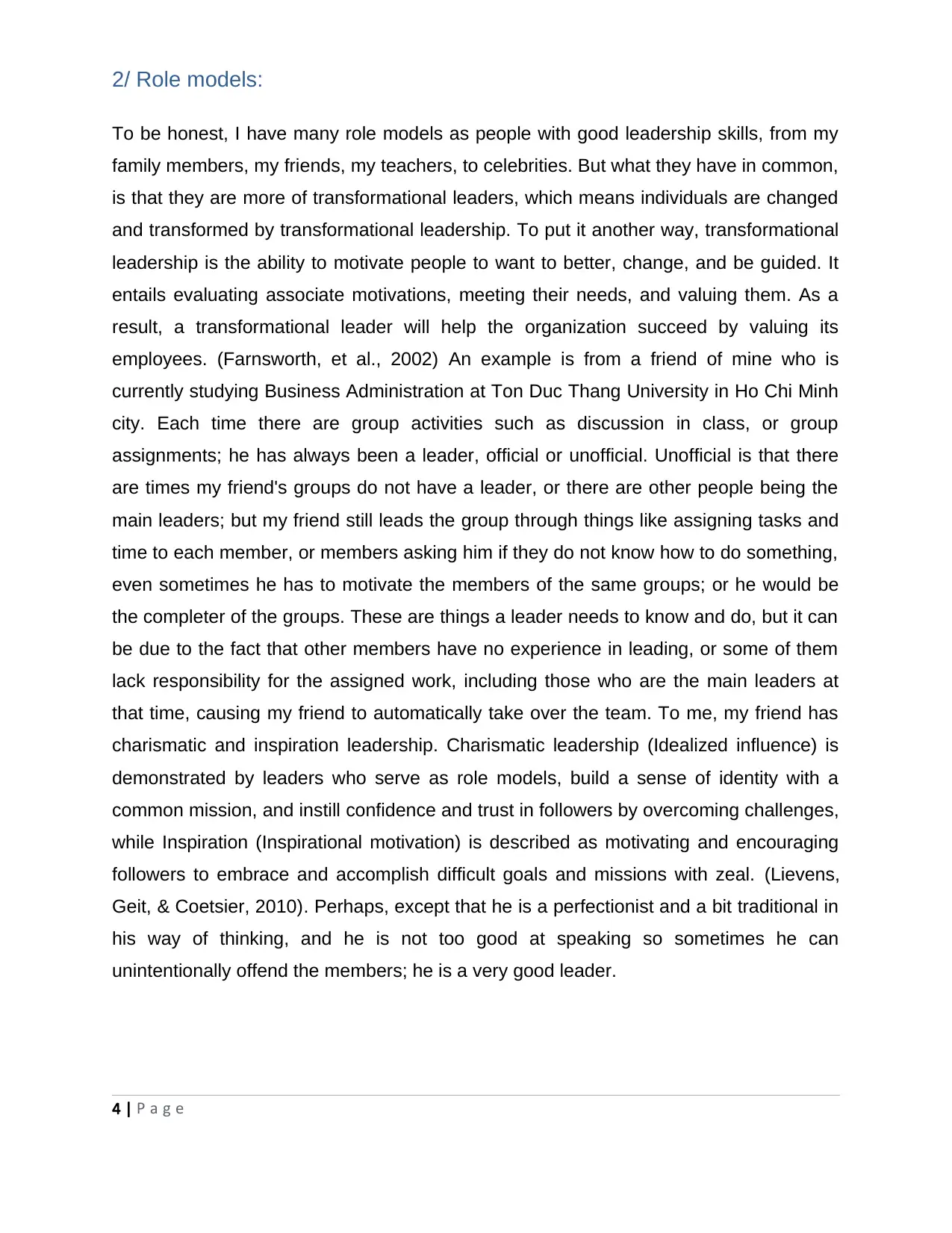
2/ Role models:
To be honest, I have many role models as people with good leadership skills, from my
family members, my friends, my teachers, to celebrities. But what they have in common,
is that they are more of transformational leaders, which means individuals are changed
and transformed by transformational leadership. To put it another way, transformational
leadership is the ability to motivate people to want to better, change, and be guided. It
entails evaluating associate motivations, meeting their needs, and valuing them. As a
result, a transformational leader will help the organization succeed by valuing its
employees. (Farnsworth, et al., 2002) An example is from a friend of mine who is
currently studying Business Administration at Ton Duc Thang University in Ho Chi Minh
city. Each time there are group activities such as discussion in class, or group
assignments; he has always been a leader, official or unofficial. Unofficial is that there
are times my friend's groups do not have a leader, or there are other people being the
main leaders; but my friend still leads the group through things like assigning tasks and
time to each member, or members asking him if they do not know how to do something,
even sometimes he has to motivate the members of the same groups; or he would be
the completer of the groups. These are things a leader needs to know and do, but it can
be due to the fact that other members have no experience in leading, or some of them
lack responsibility for the assigned work, including those who are the main leaders at
that time, causing my friend to automatically take over the team. To me, my friend has
charismatic and inspiration leadership. Charismatic leadership (Idealized influence) is
demonstrated by leaders who serve as role models, build a sense of identity with a
common mission, and instill confidence and trust in followers by overcoming challenges,
while Inspiration (Inspirational motivation) is described as motivating and encouraging
followers to embrace and accomplish difficult goals and missions with zeal. (Lievens,
Geit, & Coetsier, 2010). Perhaps, except that he is a perfectionist and a bit traditional in
his way of thinking, and he is not too good at speaking so sometimes he can
unintentionally offend the members; he is a very good leader.
4 | P a g e
To be honest, I have many role models as people with good leadership skills, from my
family members, my friends, my teachers, to celebrities. But what they have in common,
is that they are more of transformational leaders, which means individuals are changed
and transformed by transformational leadership. To put it another way, transformational
leadership is the ability to motivate people to want to better, change, and be guided. It
entails evaluating associate motivations, meeting their needs, and valuing them. As a
result, a transformational leader will help the organization succeed by valuing its
employees. (Farnsworth, et al., 2002) An example is from a friend of mine who is
currently studying Business Administration at Ton Duc Thang University in Ho Chi Minh
city. Each time there are group activities such as discussion in class, or group
assignments; he has always been a leader, official or unofficial. Unofficial is that there
are times my friend's groups do not have a leader, or there are other people being the
main leaders; but my friend still leads the group through things like assigning tasks and
time to each member, or members asking him if they do not know how to do something,
even sometimes he has to motivate the members of the same groups; or he would be
the completer of the groups. These are things a leader needs to know and do, but it can
be due to the fact that other members have no experience in leading, or some of them
lack responsibility for the assigned work, including those who are the main leaders at
that time, causing my friend to automatically take over the team. To me, my friend has
charismatic and inspiration leadership. Charismatic leadership (Idealized influence) is
demonstrated by leaders who serve as role models, build a sense of identity with a
common mission, and instill confidence and trust in followers by overcoming challenges,
while Inspiration (Inspirational motivation) is described as motivating and encouraging
followers to embrace and accomplish difficult goals and missions with zeal. (Lievens,
Geit, & Coetsier, 2010). Perhaps, except that he is a perfectionist and a bit traditional in
his way of thinking, and he is not too good at speaking so sometimes he can
unintentionally offend the members; he is a very good leader.
4 | P a g e
Secure Best Marks with AI Grader
Need help grading? Try our AI Grader for instant feedback on your assignments.
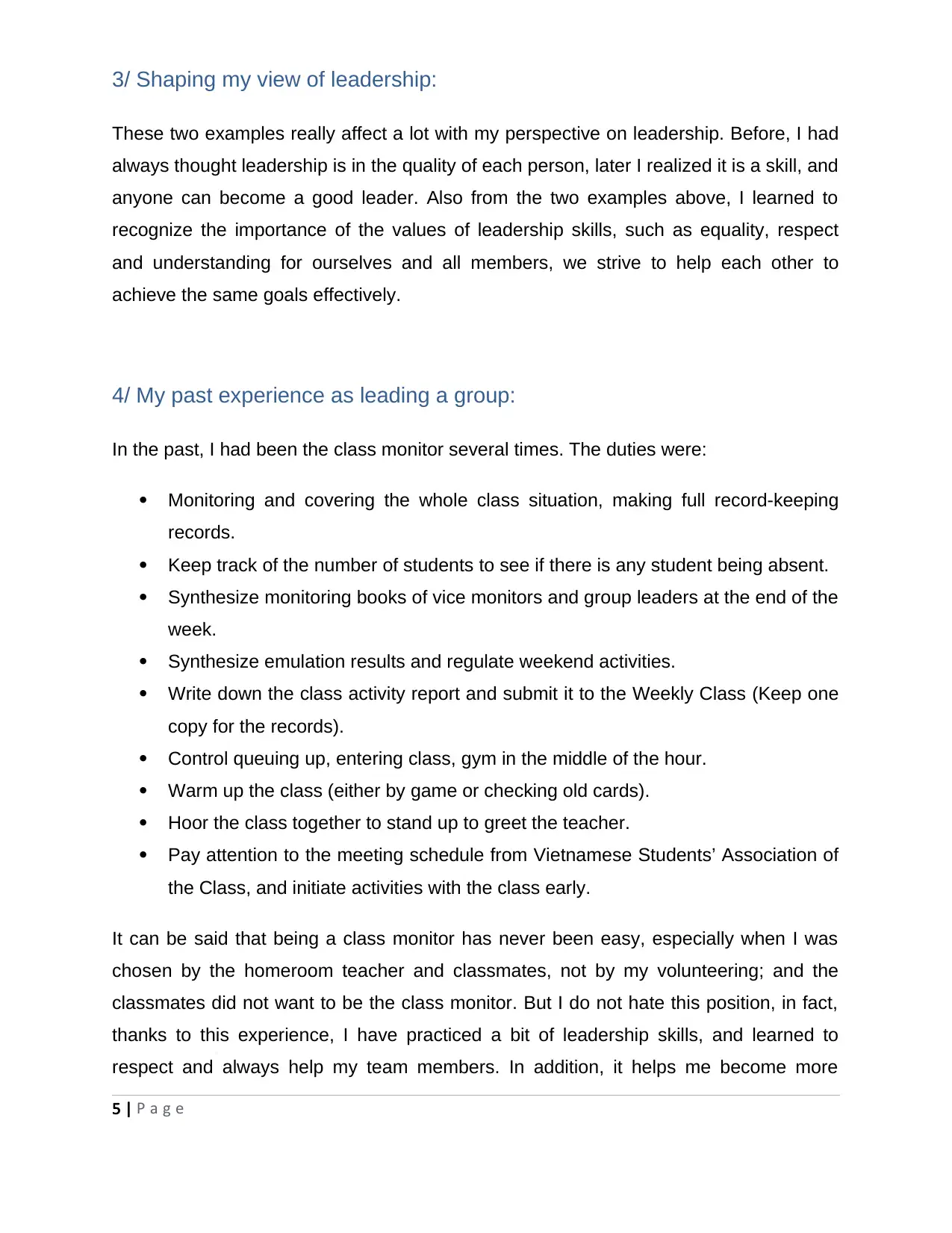
3/ Shaping my view of leadership:
These two examples really affect a lot with my perspective on leadership. Before, I had
always thought leadership is in the quality of each person, later I realized it is a skill, and
anyone can become a good leader. Also from the two examples above, I learned to
recognize the importance of the values of leadership skills, such as equality, respect
and understanding for ourselves and all members, we strive to help each other to
achieve the same goals effectively.
4/ My past experience as leading a group:
In the past, I had been the class monitor several times. The duties were:
Monitoring and covering the whole class situation, making full record-keeping
records.
Keep track of the number of students to see if there is any student being absent.
Synthesize monitoring books of vice monitors and group leaders at the end of the
week.
Synthesize emulation results and regulate weekend activities.
Write down the class activity report and submit it to the Weekly Class (Keep one
copy for the records).
Control queuing up, entering class, gym in the middle of the hour.
Warm up the class (either by game or checking old cards).
Hoor the class together to stand up to greet the teacher.
Pay attention to the meeting schedule from Vietnamese Students’ Association of
the Class, and initiate activities with the class early.
It can be said that being a class monitor has never been easy, especially when I was
chosen by the homeroom teacher and classmates, not by my volunteering; and the
classmates did not want to be the class monitor. But I do not hate this position, in fact,
thanks to this experience, I have practiced a bit of leadership skills, and learned to
respect and always help my team members. In addition, it helps me become more
5 | P a g e
These two examples really affect a lot with my perspective on leadership. Before, I had
always thought leadership is in the quality of each person, later I realized it is a skill, and
anyone can become a good leader. Also from the two examples above, I learned to
recognize the importance of the values of leadership skills, such as equality, respect
and understanding for ourselves and all members, we strive to help each other to
achieve the same goals effectively.
4/ My past experience as leading a group:
In the past, I had been the class monitor several times. The duties were:
Monitoring and covering the whole class situation, making full record-keeping
records.
Keep track of the number of students to see if there is any student being absent.
Synthesize monitoring books of vice monitors and group leaders at the end of the
week.
Synthesize emulation results and regulate weekend activities.
Write down the class activity report and submit it to the Weekly Class (Keep one
copy for the records).
Control queuing up, entering class, gym in the middle of the hour.
Warm up the class (either by game or checking old cards).
Hoor the class together to stand up to greet the teacher.
Pay attention to the meeting schedule from Vietnamese Students’ Association of
the Class, and initiate activities with the class early.
It can be said that being a class monitor has never been easy, especially when I was
chosen by the homeroom teacher and classmates, not by my volunteering; and the
classmates did not want to be the class monitor. But I do not hate this position, in fact,
thanks to this experience, I have practiced a bit of leadership skills, and learned to
respect and always help my team members. In addition, it helps me become more
5 | P a g e
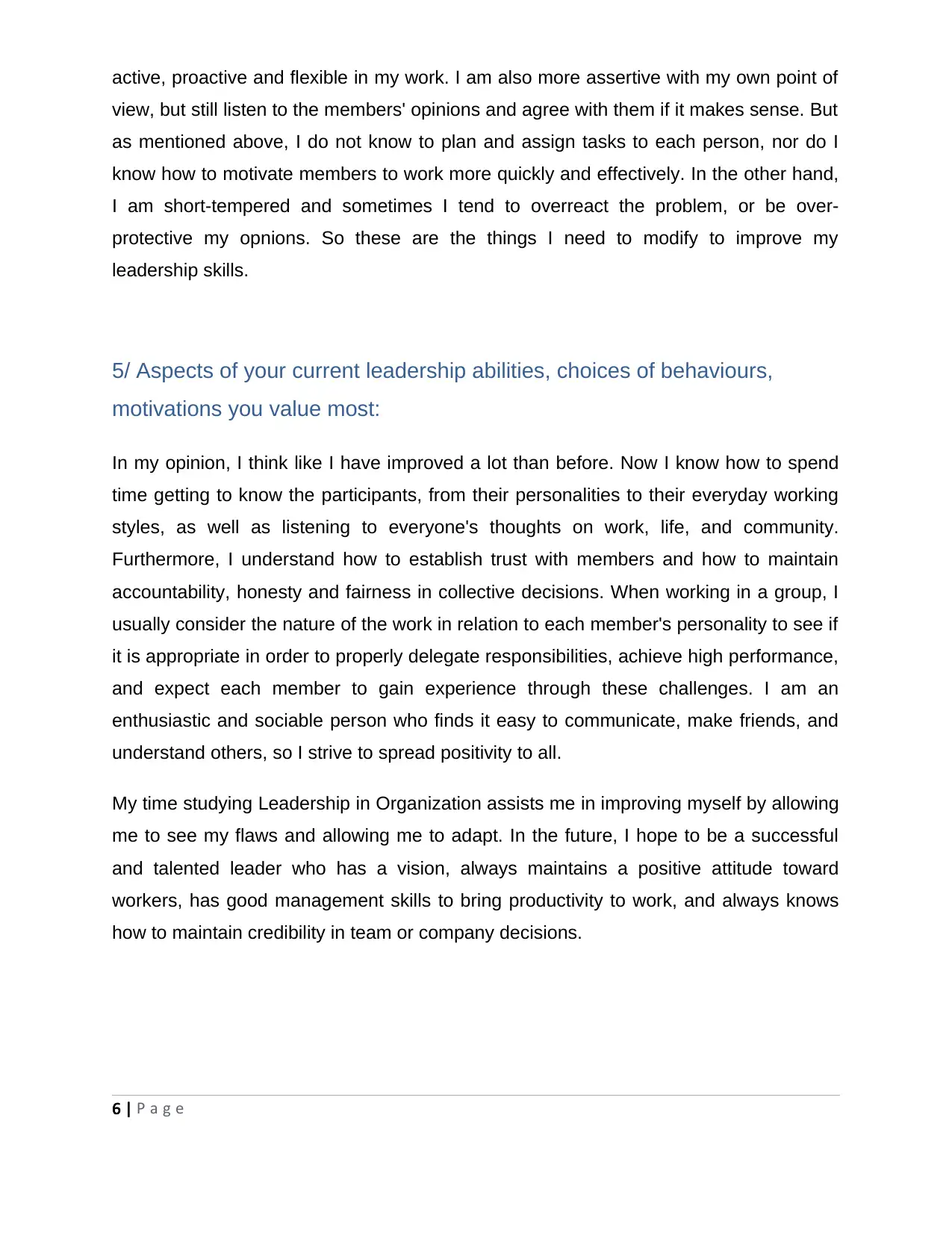
active, proactive and flexible in my work. I am also more assertive with my own point of
view, but still listen to the members' opinions and agree with them if it makes sense. But
as mentioned above, I do not know to plan and assign tasks to each person, nor do I
know how to motivate members to work more quickly and effectively. In the other hand,
I am short-tempered and sometimes I tend to overreact the problem, or be over-
protective my opnions. So these are the things I need to modify to improve my
leadership skills.
5/ Aspects of your current leadership abilities, choices of behaviours,
motivations you value most:
In my opinion, I think like I have improved a lot than before. Now I know how to spend
time getting to know the participants, from their personalities to their everyday working
styles, as well as listening to everyone's thoughts on work, life, and community.
Furthermore, I understand how to establish trust with members and how to maintain
accountability, honesty and fairness in collective decisions. When working in a group, I
usually consider the nature of the work in relation to each member's personality to see if
it is appropriate in order to properly delegate responsibilities, achieve high performance,
and expect each member to gain experience through these challenges. I am an
enthusiastic and sociable person who finds it easy to communicate, make friends, and
understand others, so I strive to spread positivity to all.
My time studying Leadership in Organization assists me in improving myself by allowing
me to see my flaws and allowing me to adapt. In the future, I hope to be a successful
and talented leader who has a vision, always maintains a positive attitude toward
workers, has good management skills to bring productivity to work, and always knows
how to maintain credibility in team or company decisions.
6 | P a g e
view, but still listen to the members' opinions and agree with them if it makes sense. But
as mentioned above, I do not know to plan and assign tasks to each person, nor do I
know how to motivate members to work more quickly and effectively. In the other hand,
I am short-tempered and sometimes I tend to overreact the problem, or be over-
protective my opnions. So these are the things I need to modify to improve my
leadership skills.
5/ Aspects of your current leadership abilities, choices of behaviours,
motivations you value most:
In my opinion, I think like I have improved a lot than before. Now I know how to spend
time getting to know the participants, from their personalities to their everyday working
styles, as well as listening to everyone's thoughts on work, life, and community.
Furthermore, I understand how to establish trust with members and how to maintain
accountability, honesty and fairness in collective decisions. When working in a group, I
usually consider the nature of the work in relation to each member's personality to see if
it is appropriate in order to properly delegate responsibilities, achieve high performance,
and expect each member to gain experience through these challenges. I am an
enthusiastic and sociable person who finds it easy to communicate, make friends, and
understand others, so I strive to spread positivity to all.
My time studying Leadership in Organization assists me in improving myself by allowing
me to see my flaws and allowing me to adapt. In the future, I hope to be a successful
and talented leader who has a vision, always maintains a positive attitude toward
workers, has good management skills to bring productivity to work, and always knows
how to maintain credibility in team or company decisions.
6 | P a g e
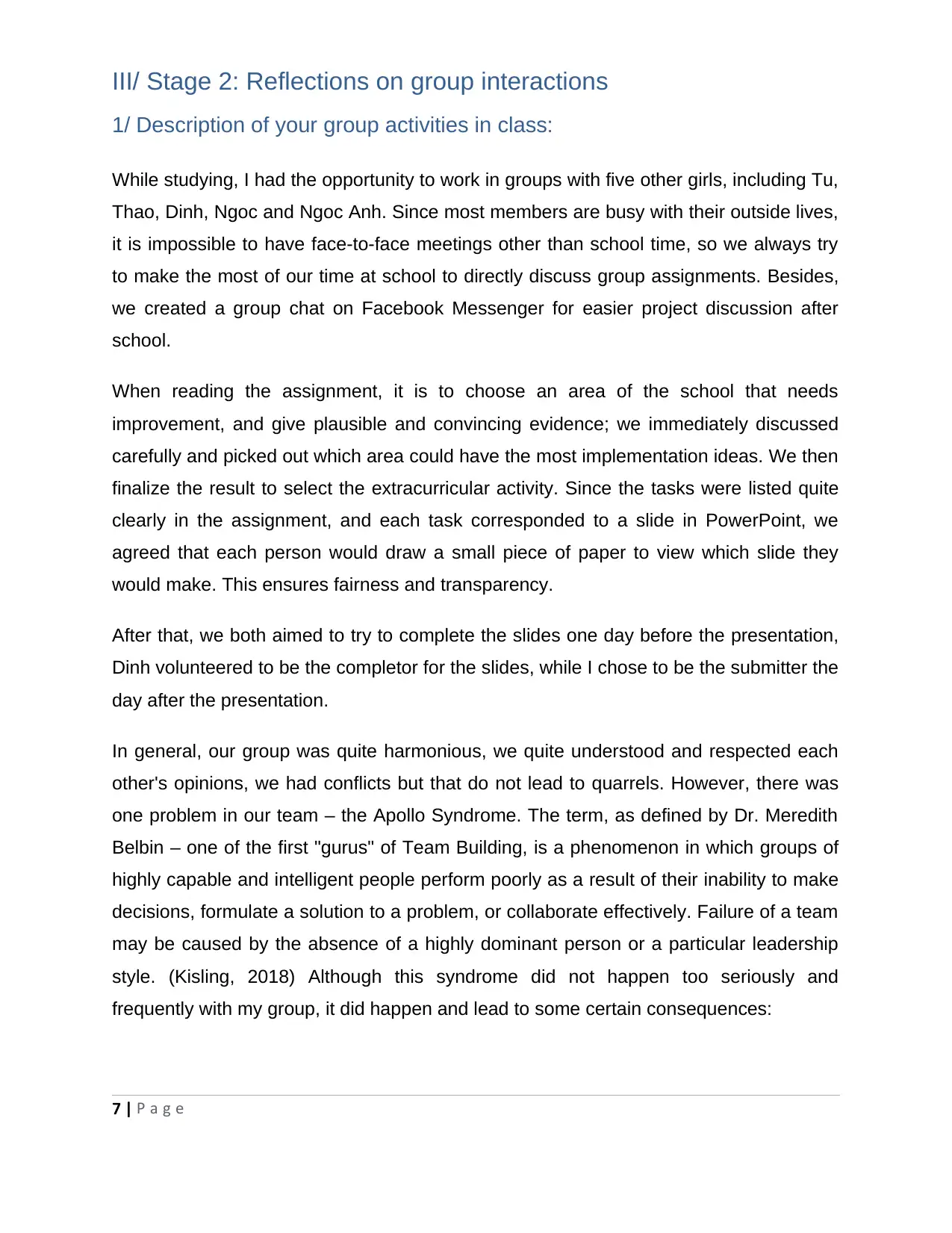
III/ Stage 2: Reflections on group interactions
1/ Description of your group activities in class:
While studying, I had the opportunity to work in groups with five other girls, including Tu,
Thao, Dinh, Ngoc and Ngoc Anh. Since most members are busy with their outside lives,
it is impossible to have face-to-face meetings other than school time, so we always try
to make the most of our time at school to directly discuss group assignments. Besides,
we created a group chat on Facebook Messenger for easier project discussion after
school.
When reading the assignment, it is to choose an area of the school that needs
improvement, and give plausible and convincing evidence; we immediately discussed
carefully and picked out which area could have the most implementation ideas. We then
finalize the result to select the extracurricular activity. Since the tasks were listed quite
clearly in the assignment, and each task corresponded to a slide in PowerPoint, we
agreed that each person would draw a small piece of paper to view which slide they
would make. This ensures fairness and transparency.
After that, we both aimed to try to complete the slides one day before the presentation,
Dinh volunteered to be the completor for the slides, while I chose to be the submitter the
day after the presentation.
In general, our group was quite harmonious, we quite understood and respected each
other's opinions, we had conflicts but that do not lead to quarrels. However, there was
one problem in our team – the Apollo Syndrome. The term, as defined by Dr. Meredith
Belbin – one of the first "gurus" of Team Building, is a phenomenon in which groups of
highly capable and intelligent people perform poorly as a result of their inability to make
decisions, formulate a solution to a problem, or collaborate effectively. Failure of a team
may be caused by the absence of a highly dominant person or a particular leadership
style. (Kisling, 2018) Although this syndrome did not happen too seriously and
frequently with my group, it did happen and lead to some certain consequences:
7 | P a g e
1/ Description of your group activities in class:
While studying, I had the opportunity to work in groups with five other girls, including Tu,
Thao, Dinh, Ngoc and Ngoc Anh. Since most members are busy with their outside lives,
it is impossible to have face-to-face meetings other than school time, so we always try
to make the most of our time at school to directly discuss group assignments. Besides,
we created a group chat on Facebook Messenger for easier project discussion after
school.
When reading the assignment, it is to choose an area of the school that needs
improvement, and give plausible and convincing evidence; we immediately discussed
carefully and picked out which area could have the most implementation ideas. We then
finalize the result to select the extracurricular activity. Since the tasks were listed quite
clearly in the assignment, and each task corresponded to a slide in PowerPoint, we
agreed that each person would draw a small piece of paper to view which slide they
would make. This ensures fairness and transparency.
After that, we both aimed to try to complete the slides one day before the presentation,
Dinh volunteered to be the completor for the slides, while I chose to be the submitter the
day after the presentation.
In general, our group was quite harmonious, we quite understood and respected each
other's opinions, we had conflicts but that do not lead to quarrels. However, there was
one problem in our team – the Apollo Syndrome. The term, as defined by Dr. Meredith
Belbin – one of the first "gurus" of Team Building, is a phenomenon in which groups of
highly capable and intelligent people perform poorly as a result of their inability to make
decisions, formulate a solution to a problem, or collaborate effectively. Failure of a team
may be caused by the absence of a highly dominant person or a particular leadership
style. (Kisling, 2018) Although this syndrome did not happen too seriously and
frequently with my group, it did happen and lead to some certain consequences:
7 | P a g e
Paraphrase This Document
Need a fresh take? Get an instant paraphrase of this document with our AI Paraphraser
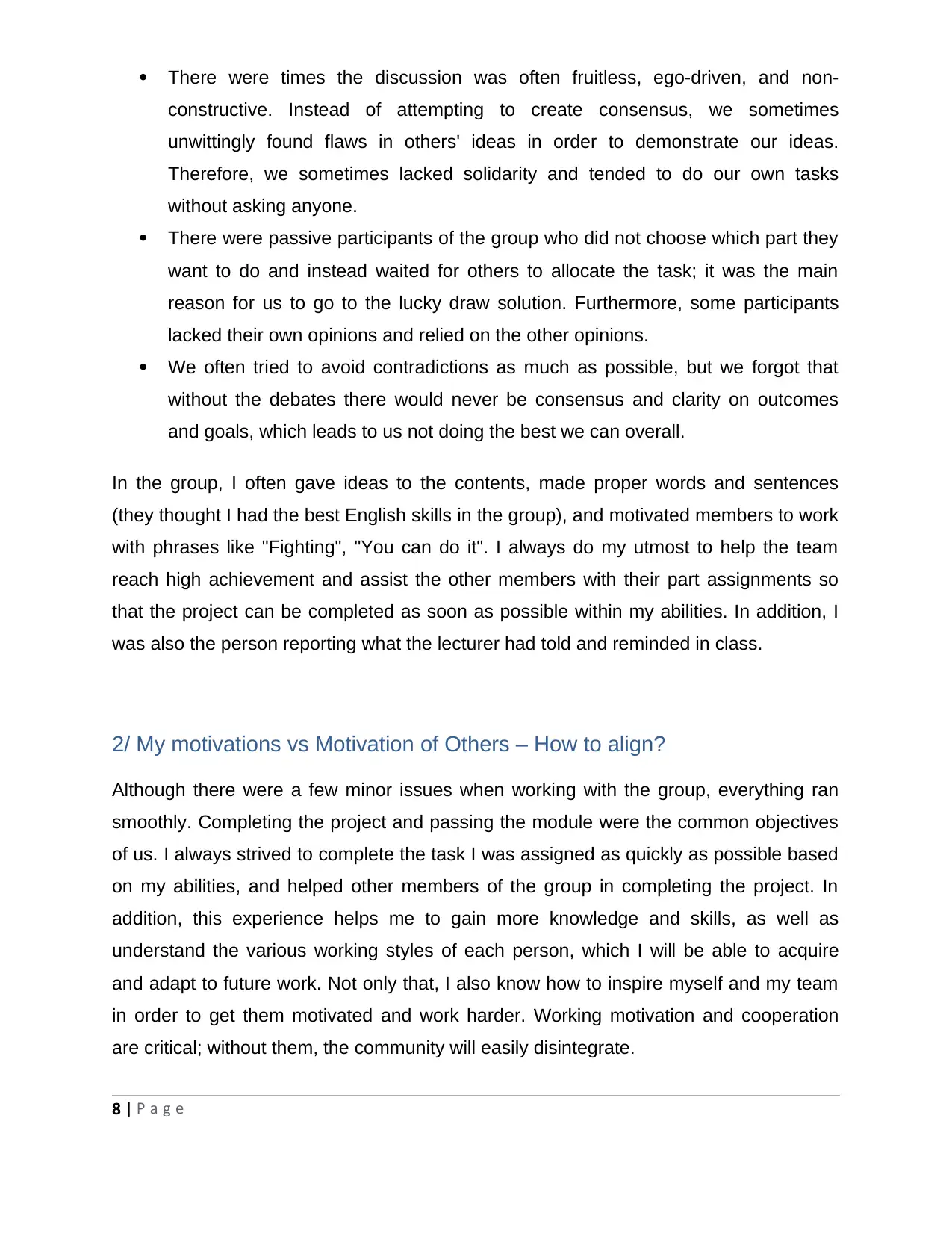
There were times the discussion was often fruitless, ego-driven, and non-
constructive. Instead of attempting to create consensus, we sometimes
unwittingly found flaws in others' ideas in order to demonstrate our ideas.
Therefore, we sometimes lacked solidarity and tended to do our own tasks
without asking anyone.
There were passive participants of the group who did not choose which part they
want to do and instead waited for others to allocate the task; it was the main
reason for us to go to the lucky draw solution. Furthermore, some participants
lacked their own opinions and relied on the other opinions.
We often tried to avoid contradictions as much as possible, but we forgot that
without the debates there would never be consensus and clarity on outcomes
and goals, which leads to us not doing the best we can overall.
In the group, I often gave ideas to the contents, made proper words and sentences
(they thought I had the best English skills in the group), and motivated members to work
with phrases like "Fighting", "You can do it". I always do my utmost to help the team
reach high achievement and assist the other members with their part assignments so
that the project can be completed as soon as possible within my abilities. In addition, I
was also the person reporting what the lecturer had told and reminded in class.
2/ My motivations vs Motivation of Others – How to align?
Although there were a few minor issues when working with the group, everything ran
smoothly. Completing the project and passing the module were the common objectives
of us. I always strived to complete the task I was assigned as quickly as possible based
on my abilities, and helped other members of the group in completing the project. In
addition, this experience helps me to gain more knowledge and skills, as well as
understand the various working styles of each person, which I will be able to acquire
and adapt to future work. Not only that, I also know how to inspire myself and my team
in order to get them motivated and work harder. Working motivation and cooperation
are critical; without them, the community will easily disintegrate.
8 | P a g e
constructive. Instead of attempting to create consensus, we sometimes
unwittingly found flaws in others' ideas in order to demonstrate our ideas.
Therefore, we sometimes lacked solidarity and tended to do our own tasks
without asking anyone.
There were passive participants of the group who did not choose which part they
want to do and instead waited for others to allocate the task; it was the main
reason for us to go to the lucky draw solution. Furthermore, some participants
lacked their own opinions and relied on the other opinions.
We often tried to avoid contradictions as much as possible, but we forgot that
without the debates there would never be consensus and clarity on outcomes
and goals, which leads to us not doing the best we can overall.
In the group, I often gave ideas to the contents, made proper words and sentences
(they thought I had the best English skills in the group), and motivated members to work
with phrases like "Fighting", "You can do it". I always do my utmost to help the team
reach high achievement and assist the other members with their part assignments so
that the project can be completed as soon as possible within my abilities. In addition, I
was also the person reporting what the lecturer had told and reminded in class.
2/ My motivations vs Motivation of Others – How to align?
Although there were a few minor issues when working with the group, everything ran
smoothly. Completing the project and passing the module were the common objectives
of us. I always strived to complete the task I was assigned as quickly as possible based
on my abilities, and helped other members of the group in completing the project. In
addition, this experience helps me to gain more knowledge and skills, as well as
understand the various working styles of each person, which I will be able to acquire
and adapt to future work. Not only that, I also know how to inspire myself and my team
in order to get them motivated and work harder. Working motivation and cooperation
are critical; without them, the community will easily disintegrate.
8 | P a g e
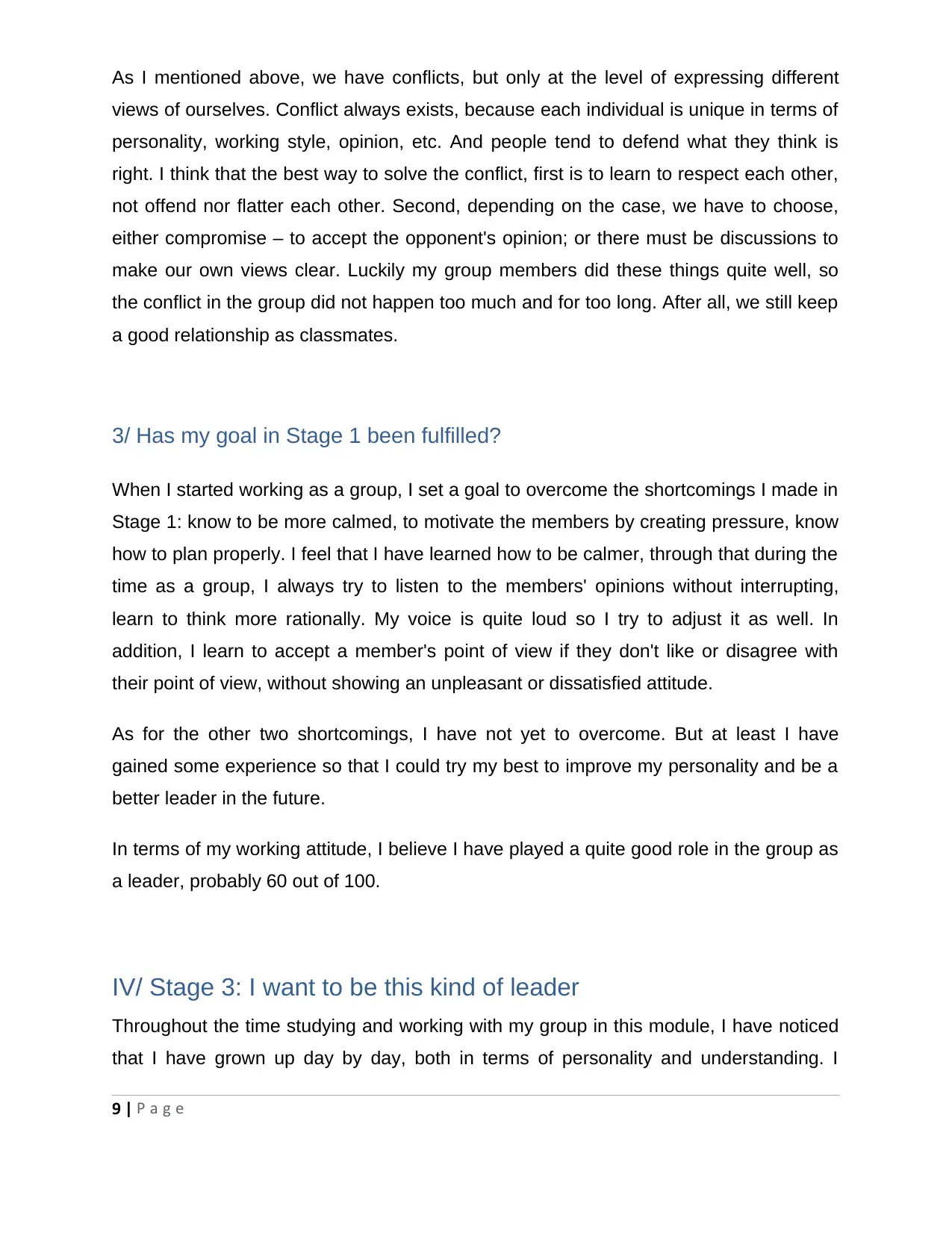
As I mentioned above, we have conflicts, but only at the level of expressing different
views of ourselves. Conflict always exists, because each individual is unique in terms of
personality, working style, opinion, etc. And people tend to defend what they think is
right. I think that the best way to solve the conflict, first is to learn to respect each other,
not offend nor flatter each other. Second, depending on the case, we have to choose,
either compromise – to accept the opponent's opinion; or there must be discussions to
make our own views clear. Luckily my group members did these things quite well, so
the conflict in the group did not happen too much and for too long. After all, we still keep
a good relationship as classmates.
3/ Has my goal in Stage 1 been fulfilled?
When I started working as a group, I set a goal to overcome the shortcomings I made in
Stage 1: know to be more calmed, to motivate the members by creating pressure, know
how to plan properly. I feel that I have learned how to be calmer, through that during the
time as a group, I always try to listen to the members' opinions without interrupting,
learn to think more rationally. My voice is quite loud so I try to adjust it as well. In
addition, I learn to accept a member's point of view if they don't like or disagree with
their point of view, without showing an unpleasant or dissatisfied attitude.
As for the other two shortcomings, I have not yet to overcome. But at least I have
gained some experience so that I could try my best to improve my personality and be a
better leader in the future.
In terms of my working attitude, I believe I have played a quite good role in the group as
a leader, probably 60 out of 100.
IV/ Stage 3: I want to be this kind of leader
Throughout the time studying and working with my group in this module, I have noticed
that I have grown up day by day, both in terms of personality and understanding. I
9 | P a g e
views of ourselves. Conflict always exists, because each individual is unique in terms of
personality, working style, opinion, etc. And people tend to defend what they think is
right. I think that the best way to solve the conflict, first is to learn to respect each other,
not offend nor flatter each other. Second, depending on the case, we have to choose,
either compromise – to accept the opponent's opinion; or there must be discussions to
make our own views clear. Luckily my group members did these things quite well, so
the conflict in the group did not happen too much and for too long. After all, we still keep
a good relationship as classmates.
3/ Has my goal in Stage 1 been fulfilled?
When I started working as a group, I set a goal to overcome the shortcomings I made in
Stage 1: know to be more calmed, to motivate the members by creating pressure, know
how to plan properly. I feel that I have learned how to be calmer, through that during the
time as a group, I always try to listen to the members' opinions without interrupting,
learn to think more rationally. My voice is quite loud so I try to adjust it as well. In
addition, I learn to accept a member's point of view if they don't like or disagree with
their point of view, without showing an unpleasant or dissatisfied attitude.
As for the other two shortcomings, I have not yet to overcome. But at least I have
gained some experience so that I could try my best to improve my personality and be a
better leader in the future.
In terms of my working attitude, I believe I have played a quite good role in the group as
a leader, probably 60 out of 100.
IV/ Stage 3: I want to be this kind of leader
Throughout the time studying and working with my group in this module, I have noticed
that I have grown up day by day, both in terms of personality and understanding. I
9 | P a g e
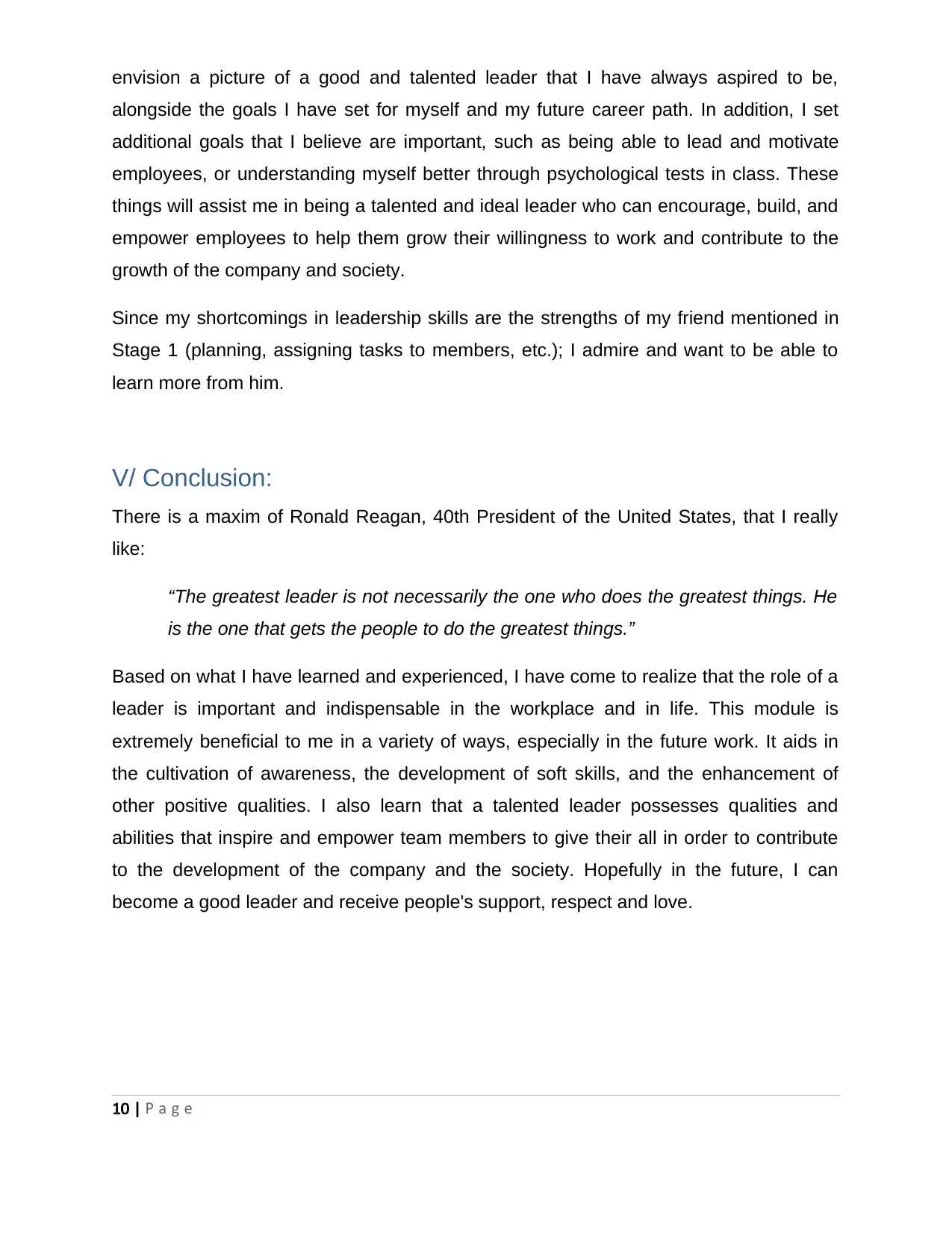
envision a picture of a good and talented leader that I have always aspired to be,
alongside the goals I have set for myself and my future career path. In addition, I set
additional goals that I believe are important, such as being able to lead and motivate
employees, or understanding myself better through psychological tests in class. These
things will assist me in being a talented and ideal leader who can encourage, build, and
empower employees to help them grow their willingness to work and contribute to the
growth of the company and society.
Since my shortcomings in leadership skills are the strengths of my friend mentioned in
Stage 1 (planning, assigning tasks to members, etc.); I admire and want to be able to
learn more from him.
V/ Conclusion:
There is a maxim of Ronald Reagan, 40th President of the United States, that I really
like:
“The greatest leader is not necessarily the one who does the greatest things. He
is the one that gets the people to do the greatest things.”
Based on what I have learned and experienced, I have come to realize that the role of a
leader is important and indispensable in the workplace and in life. This module is
extremely beneficial to me in a variety of ways, especially in the future work. It aids in
the cultivation of awareness, the development of soft skills, and the enhancement of
other positive qualities. I also learn that a talented leader possesses qualities and
abilities that inspire and empower team members to give their all in order to contribute
to the development of the company and the society. Hopefully in the future, I can
become a good leader and receive people's support, respect and love.
10 | P a g e
alongside the goals I have set for myself and my future career path. In addition, I set
additional goals that I believe are important, such as being able to lead and motivate
employees, or understanding myself better through psychological tests in class. These
things will assist me in being a talented and ideal leader who can encourage, build, and
empower employees to help them grow their willingness to work and contribute to the
growth of the company and society.
Since my shortcomings in leadership skills are the strengths of my friend mentioned in
Stage 1 (planning, assigning tasks to members, etc.); I admire and want to be able to
learn more from him.
V/ Conclusion:
There is a maxim of Ronald Reagan, 40th President of the United States, that I really
like:
“The greatest leader is not necessarily the one who does the greatest things. He
is the one that gets the people to do the greatest things.”
Based on what I have learned and experienced, I have come to realize that the role of a
leader is important and indispensable in the workplace and in life. This module is
extremely beneficial to me in a variety of ways, especially in the future work. It aids in
the cultivation of awareness, the development of soft skills, and the enhancement of
other positive qualities. I also learn that a talented leader possesses qualities and
abilities that inspire and empower team members to give their all in order to contribute
to the development of the company and the society. Hopefully in the future, I can
become a good leader and receive people's support, respect and love.
10 | P a g e
Secure Best Marks with AI Grader
Need help grading? Try our AI Grader for instant feedback on your assignments.
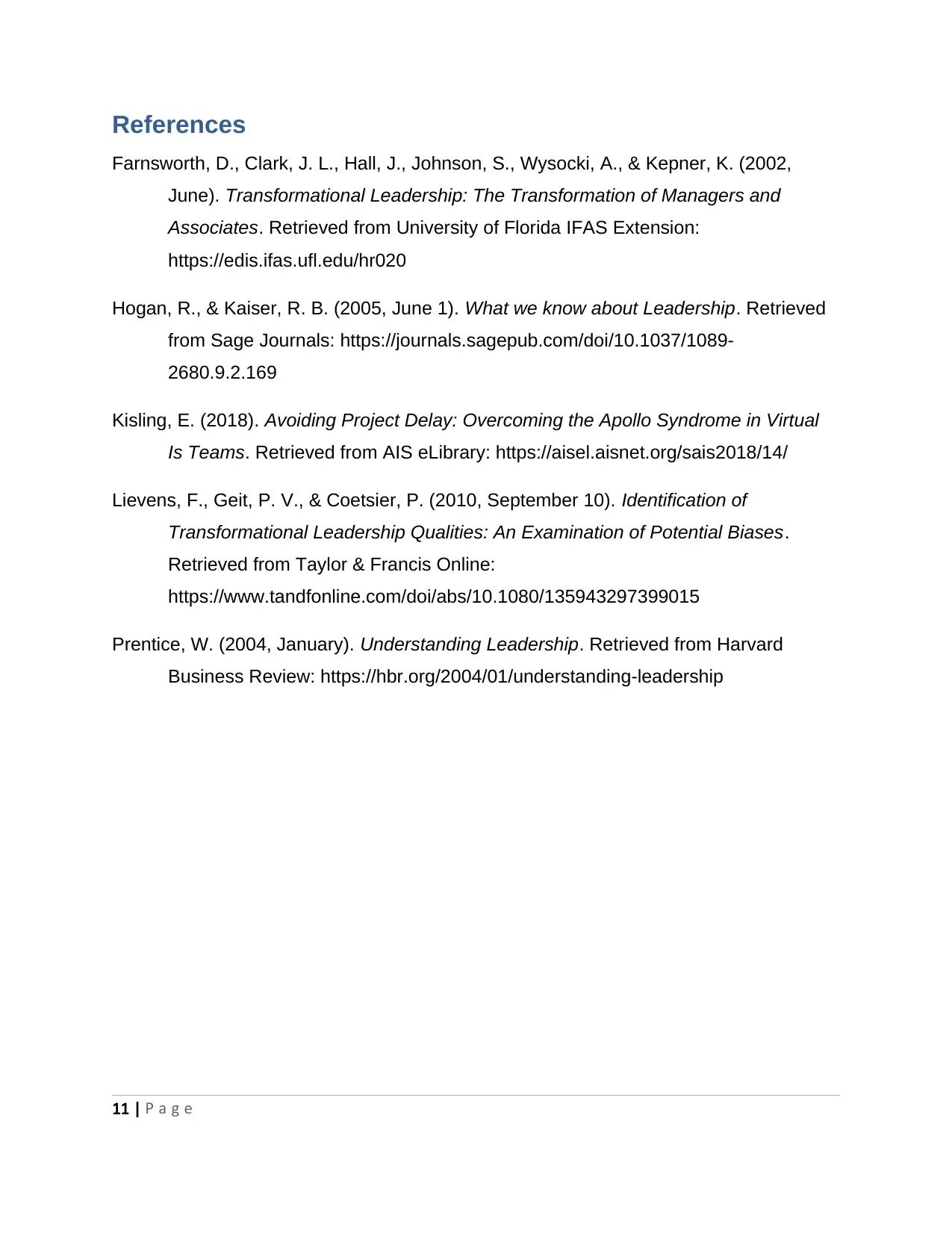
References
Farnsworth, D., Clark, J. L., Hall, J., Johnson, S., Wysocki, A., & Kepner, K. (2002,
June). Transformational Leadership: The Transformation of Managers and
Associates. Retrieved from University of Florida IFAS Extension:
https://edis.ifas.ufl.edu/hr020
Hogan, R., & Kaiser, R. B. (2005, June 1). What we know about Leadership. Retrieved
from Sage Journals: https://journals.sagepub.com/doi/10.1037/1089-
2680.9.2.169
Kisling, E. (2018). Avoiding Project Delay: Overcoming the Apollo Syndrome in Virtual
Is Teams. Retrieved from AIS eLibrary: https://aisel.aisnet.org/sais2018/14/
Lievens, F., Geit, P. V., & Coetsier, P. (2010, September 10). Identification of
Transformational Leadership Qualities: An Examination of Potential Biases.
Retrieved from Taylor & Francis Online:
https://www.tandfonline.com/doi/abs/10.1080/135943297399015
Prentice, W. (2004, January). Understanding Leadership. Retrieved from Harvard
Business Review: https://hbr.org/2004/01/understanding-leadership
11 | P a g e
Farnsworth, D., Clark, J. L., Hall, J., Johnson, S., Wysocki, A., & Kepner, K. (2002,
June). Transformational Leadership: The Transformation of Managers and
Associates. Retrieved from University of Florida IFAS Extension:
https://edis.ifas.ufl.edu/hr020
Hogan, R., & Kaiser, R. B. (2005, June 1). What we know about Leadership. Retrieved
from Sage Journals: https://journals.sagepub.com/doi/10.1037/1089-
2680.9.2.169
Kisling, E. (2018). Avoiding Project Delay: Overcoming the Apollo Syndrome in Virtual
Is Teams. Retrieved from AIS eLibrary: https://aisel.aisnet.org/sais2018/14/
Lievens, F., Geit, P. V., & Coetsier, P. (2010, September 10). Identification of
Transformational Leadership Qualities: An Examination of Potential Biases.
Retrieved from Taylor & Francis Online:
https://www.tandfonline.com/doi/abs/10.1080/135943297399015
Prentice, W. (2004, January). Understanding Leadership. Retrieved from Harvard
Business Review: https://hbr.org/2004/01/understanding-leadership
11 | P a g e
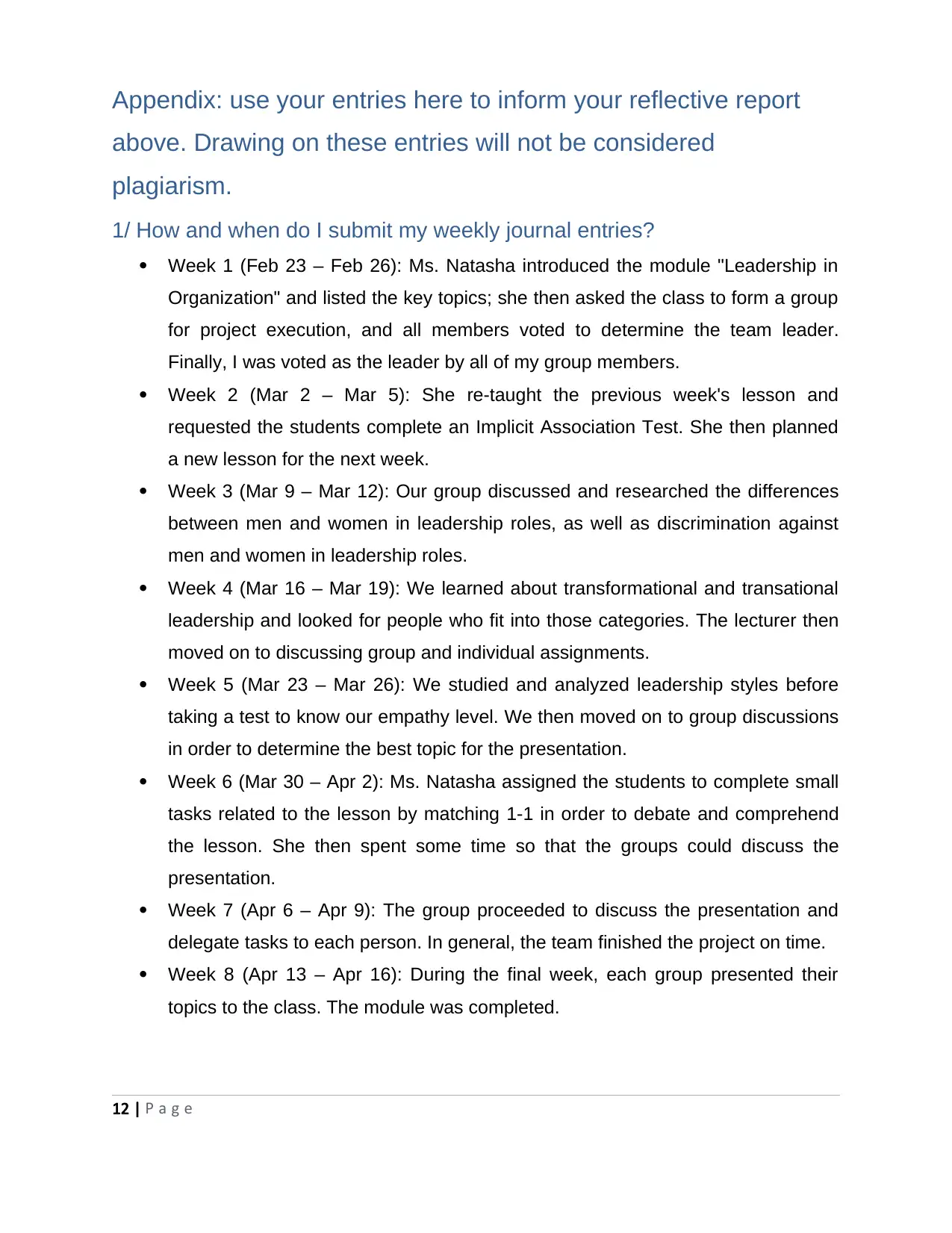
Appendix: use your entries here to inform your reflective report
above. Drawing on these entries will not be considered
plagiarism.
1/ How and when do I submit my weekly journal entries?
Week 1 (Feb 23 – Feb 26): Ms. Natasha introduced the module "Leadership in
Organization" and listed the key topics; she then asked the class to form a group
for project execution, and all members voted to determine the team leader.
Finally, I was voted as the leader by all of my group members.
Week 2 (Mar 2 – Mar 5): She re-taught the previous week's lesson and
requested the students complete an Implicit Association Test. She then planned
a new lesson for the next week.
Week 3 (Mar 9 – Mar 12): Our group discussed and researched the differences
between men and women in leadership roles, as well as discrimination against
men and women in leadership roles.
Week 4 (Mar 16 – Mar 19): We learned about transformational and transational
leadership and looked for people who fit into those categories. The lecturer then
moved on to discussing group and individual assignments.
Week 5 (Mar 23 – Mar 26): We studied and analyzed leadership styles before
taking a test to know our empathy level. We then moved on to group discussions
in order to determine the best topic for the presentation.
Week 6 (Mar 30 – Apr 2): Ms. Natasha assigned the students to complete small
tasks related to the lesson by matching 1-1 in order to debate and comprehend
the lesson. She then spent some time so that the groups could discuss the
presentation.
Week 7 (Apr 6 – Apr 9): The group proceeded to discuss the presentation and
delegate tasks to each person. In general, the team finished the project on time.
Week 8 (Apr 13 – Apr 16): During the final week, each group presented their
topics to the class. The module was completed.
12 | P a g e
above. Drawing on these entries will not be considered
plagiarism.
1/ How and when do I submit my weekly journal entries?
Week 1 (Feb 23 – Feb 26): Ms. Natasha introduced the module "Leadership in
Organization" and listed the key topics; she then asked the class to form a group
for project execution, and all members voted to determine the team leader.
Finally, I was voted as the leader by all of my group members.
Week 2 (Mar 2 – Mar 5): She re-taught the previous week's lesson and
requested the students complete an Implicit Association Test. She then planned
a new lesson for the next week.
Week 3 (Mar 9 – Mar 12): Our group discussed and researched the differences
between men and women in leadership roles, as well as discrimination against
men and women in leadership roles.
Week 4 (Mar 16 – Mar 19): We learned about transformational and transational
leadership and looked for people who fit into those categories. The lecturer then
moved on to discussing group and individual assignments.
Week 5 (Mar 23 – Mar 26): We studied and analyzed leadership styles before
taking a test to know our empathy level. We then moved on to group discussions
in order to determine the best topic for the presentation.
Week 6 (Mar 30 – Apr 2): Ms. Natasha assigned the students to complete small
tasks related to the lesson by matching 1-1 in order to debate and comprehend
the lesson. She then spent some time so that the groups could discuss the
presentation.
Week 7 (Apr 6 – Apr 9): The group proceeded to discuss the presentation and
delegate tasks to each person. In general, the team finished the project on time.
Week 8 (Apr 13 – Apr 16): During the final week, each group presented their
topics to the class. The module was completed.
12 | P a g e
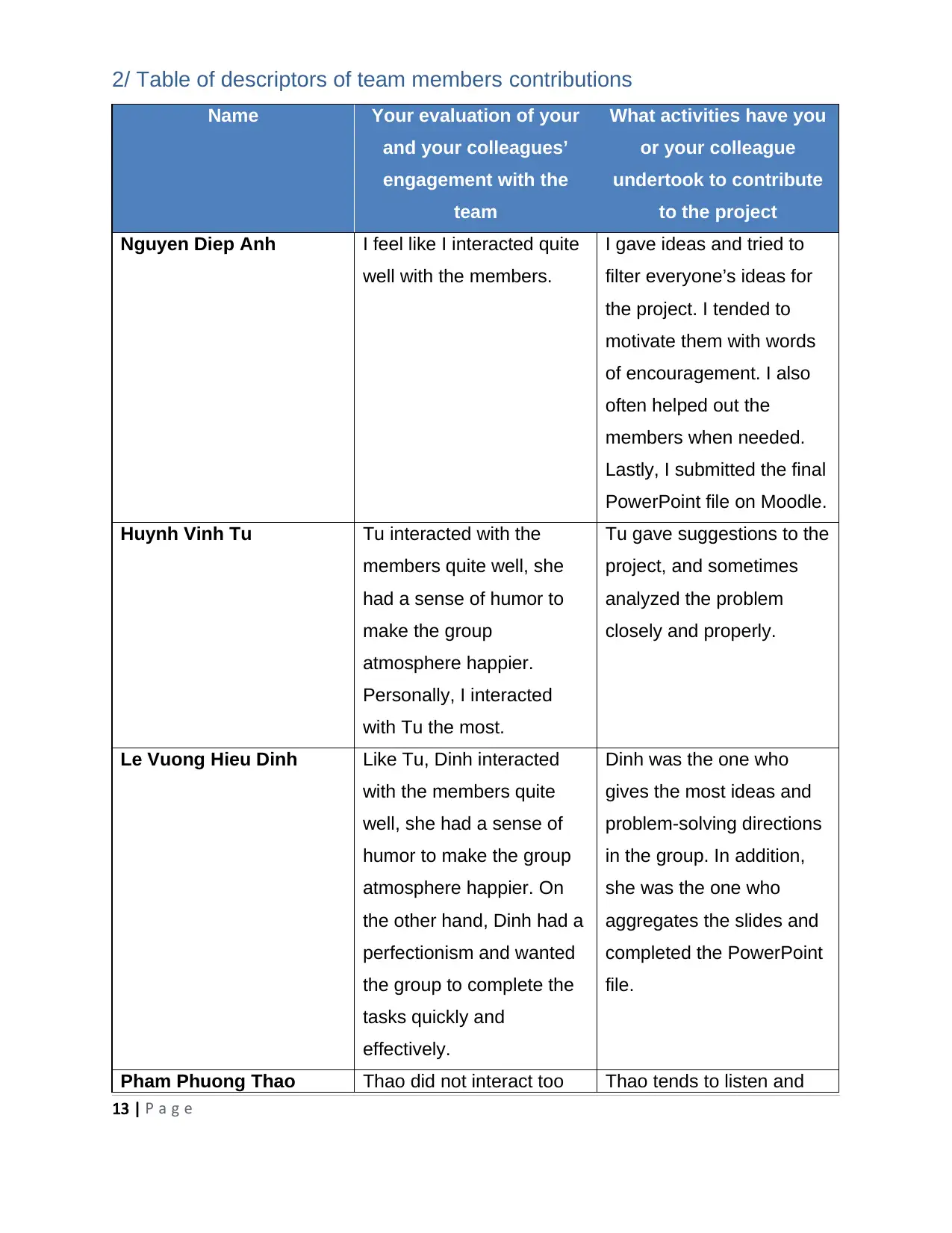
2/ Table of descriptors of team members contributions
Name Your evaluation of your
and your colleagues’
engagement with the
team
What activities have you
or your colleague
undertook to contribute
to the project
Nguyen Diep Anh I feel like I interacted quite
well with the members.
I gave ideas and tried to
filter everyone’s ideas for
the project. I tended to
motivate them with words
of encouragement. I also
often helped out the
members when needed.
Lastly, I submitted the final
PowerPoint file on Moodle.
Huynh Vinh Tu Tu interacted with the
members quite well, she
had a sense of humor to
make the group
atmosphere happier.
Personally, I interacted
with Tu the most.
Tu gave suggestions to the
project, and sometimes
analyzed the problem
closely and properly.
Le Vuong Hieu Dinh Like Tu, Dinh interacted
with the members quite
well, she had a sense of
humor to make the group
atmosphere happier. On
the other hand, Dinh had a
perfectionism and wanted
the group to complete the
tasks quickly and
effectively.
Dinh was the one who
gives the most ideas and
problem-solving directions
in the group. In addition,
she was the one who
aggregates the slides and
completed the PowerPoint
file.
Pham Phuong Thao Thao did not interact too Thao tends to listen and
13 | P a g e
Name Your evaluation of your
and your colleagues’
engagement with the
team
What activities have you
or your colleague
undertook to contribute
to the project
Nguyen Diep Anh I feel like I interacted quite
well with the members.
I gave ideas and tried to
filter everyone’s ideas for
the project. I tended to
motivate them with words
of encouragement. I also
often helped out the
members when needed.
Lastly, I submitted the final
PowerPoint file on Moodle.
Huynh Vinh Tu Tu interacted with the
members quite well, she
had a sense of humor to
make the group
atmosphere happier.
Personally, I interacted
with Tu the most.
Tu gave suggestions to the
project, and sometimes
analyzed the problem
closely and properly.
Le Vuong Hieu Dinh Like Tu, Dinh interacted
with the members quite
well, she had a sense of
humor to make the group
atmosphere happier. On
the other hand, Dinh had a
perfectionism and wanted
the group to complete the
tasks quickly and
effectively.
Dinh was the one who
gives the most ideas and
problem-solving directions
in the group. In addition,
she was the one who
aggregates the slides and
completed the PowerPoint
file.
Pham Phuong Thao Thao did not interact too Thao tends to listen and
13 | P a g e
Paraphrase This Document
Need a fresh take? Get an instant paraphrase of this document with our AI Paraphraser
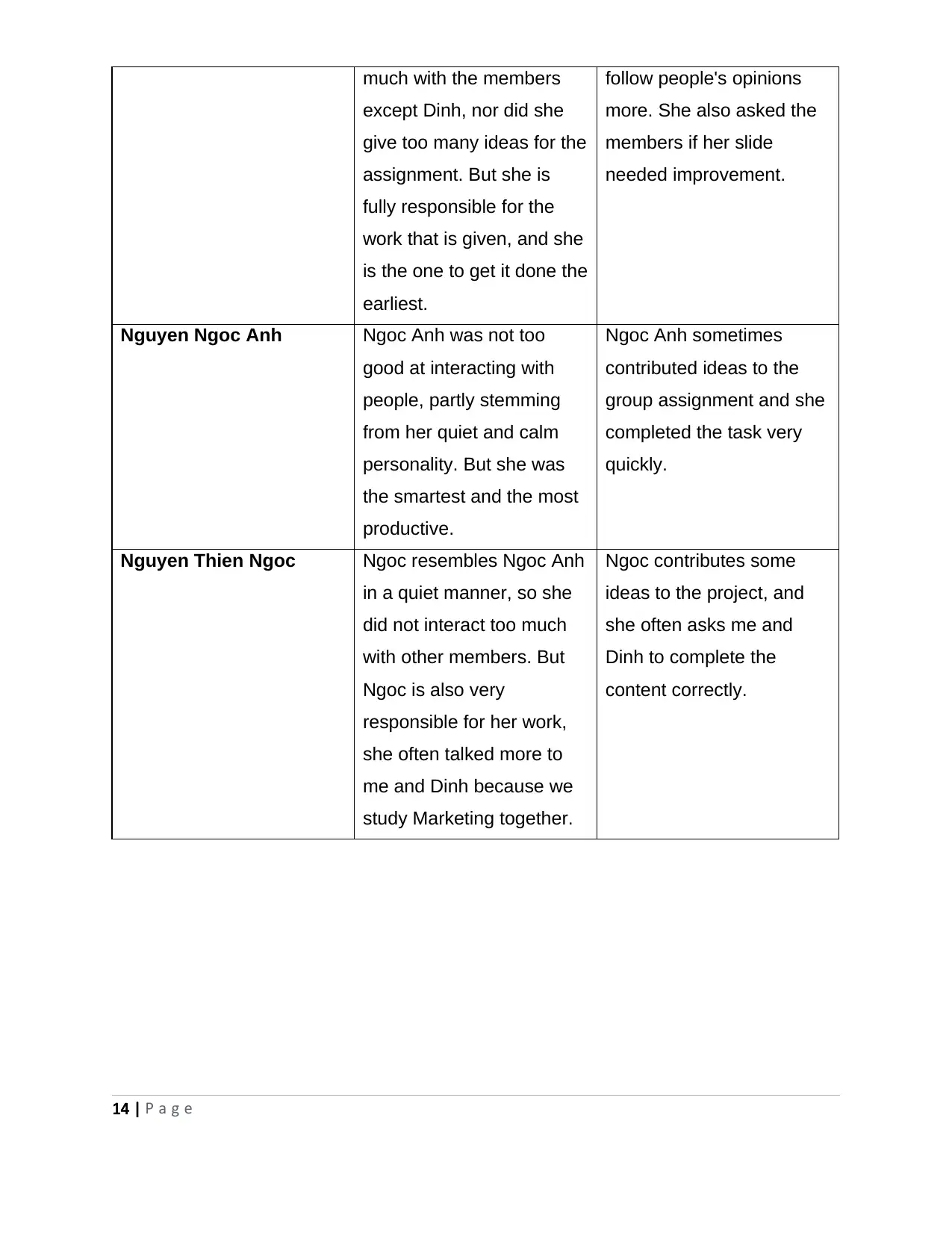
much with the members
except Dinh, nor did she
give too many ideas for the
assignment. But she is
fully responsible for the
work that is given, and she
is the one to get it done the
earliest.
follow people's opinions
more. She also asked the
members if her slide
needed improvement.
Nguyen Ngoc Anh Ngoc Anh was not too
good at interacting with
people, partly stemming
from her quiet and calm
personality. But she was
the smartest and the most
productive.
Ngoc Anh sometimes
contributed ideas to the
group assignment and she
completed the task very
quickly.
Nguyen Thien Ngoc Ngoc resembles Ngoc Anh
in a quiet manner, so she
did not interact too much
with other members. But
Ngoc is also very
responsible for her work,
she often talked more to
me and Dinh because we
study Marketing together.
Ngoc contributes some
ideas to the project, and
she often asks me and
Dinh to complete the
content correctly.
14 | P a g e
except Dinh, nor did she
give too many ideas for the
assignment. But she is
fully responsible for the
work that is given, and she
is the one to get it done the
earliest.
follow people's opinions
more. She also asked the
members if her slide
needed improvement.
Nguyen Ngoc Anh Ngoc Anh was not too
good at interacting with
people, partly stemming
from her quiet and calm
personality. But she was
the smartest and the most
productive.
Ngoc Anh sometimes
contributed ideas to the
group assignment and she
completed the task very
quickly.
Nguyen Thien Ngoc Ngoc resembles Ngoc Anh
in a quiet manner, so she
did not interact too much
with other members. But
Ngoc is also very
responsible for her work,
she often talked more to
me and Dinh because we
study Marketing together.
Ngoc contributes some
ideas to the project, and
she often asks me and
Dinh to complete the
content correctly.
14 | P a g e
1 out of 14
Related Documents
Your All-in-One AI-Powered Toolkit for Academic Success.
+13062052269
info@desklib.com
Available 24*7 on WhatsApp / Email
![[object Object]](/_next/static/media/star-bottom.7253800d.svg)
Unlock your academic potential
© 2024 | Zucol Services PVT LTD | All rights reserved.





